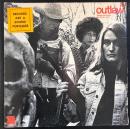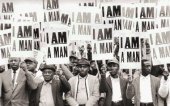Everybody wants freedom
Everybody wants freedom
Everybody wants freedom freedom
In the cotton fields, Freedom...
Get yourself a little freedom
In the factory freedom
In your neighborhood freedom
Brother Johnson says freedom
Sister Mary says freedom
Captain Charlie hates freedom .
We don't care we'll get freedom
We're gonna sing and shout freedom
We're gonna walk and talk freedom...
Everybody wants freedom
Everybody wants freedom freedom
In the cotton fields, Freedom...
Get yourself a little freedom
In the factory freedom
In your neighborhood freedom
Brother Johnson says freedom
Sister Mary says freedom
Captain Charlie hates freedom .
We don't care we'll get freedom
We're gonna sing and shout freedom
We're gonna walk and talk freedom...
Contributed by dq82 - 2016/10/23 - 18:49
×
![]()
Note for non-Italian users: Sorry, though the interface of this website is translated into English, most commentaries and biographies are in Italian and/or in other languages like French, German, Spanish, Russian etc.





Learned from Len Holt of Norfolk, Virginia
Tune: Amen
You just go on and on improvising as you go, and getting in lots of rich harmony. This song is an example of how in the integration movement in the Southern states new words are always being put to old tunes, at meetings, on picket lines and in jail. Like this ones most of the tunes-are old church hymns.
pubblicato nel 1965
Freedom Songs: Selma, Alabama
On February 18th, 1965, Jimmie Lee Jackson was fatally shot by an Alabama state trooper during a peaceful protest. The shooting inspired a march from Selma to Montgomery on March 7th. As the six hundred protesters reached the Edmund Pettus Bridge to cross the Alabama River, state troopers and local police blocked their path and ordered them to turn around. When the protesters refused, officers shot tear gas and beat some of the protesters with clubs. More than fifty people were hospitalized during the march, which became known as “Bloody Sunday.” A subsequent march on March 9th also was stopped, this time without violence; finally, later in March, a larger, better organized third march successfully reached Montgomery. Partially as a result of these protests, on August 6th, 1965, the U.S. Congress passed the Voting Rights Act.
This album was recorded and produced by Carl Benkert, who served as the night watchman for the marchers and made audio recordings of the third march. Benkert’s liner notes tell the story of the protesters, including lyrics to these powerful songs and riveting photographs of the march.
Smithsonian Folkways